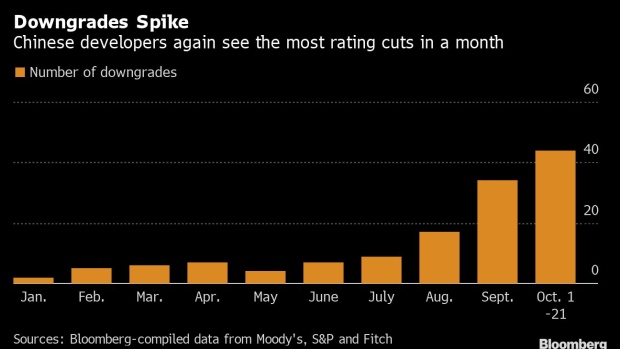(Bloomberg) -- China has urged companies to make payments on their offshore bonds, and asked China Evergrande Group’s billionaire founder Hui Ka Yan to tap his personal wealth to help solve the company’s deepening debt crisis.
The National Development and Reform Commission, which oversees foreign debt issuance, called on companies to “optimize their foreign debt structure” to raise funds, and said it will continue to meet firms’ “reasonable needs” for the rollover of foreign debt and repayment, according to a statement late Tuesday following a meeting with key industries. The statement didn’t name companies.
China has clamped down on the indebted real estate sector, making it difficult for developers to refinance as they face falling home prices and sales. Multiple developers have defaulted this month, although Evergrande made a coupon payment last week before a grace period expired.
The focus now turns to the end of a grace period on another Evergrande dollar bond later this week, with creditors bracing for an eventual debt restructuring that could rank among the largest ever in China. Evergrande’s bonds edged higher in early trading.
Key Developments:
- Record Chinese Defaults in Focus as Modern Land Misses Deadline
- Why China’s Developers Have So Much Dollar Debt: QuickTake
- Chinese Developer Ronshine Says It Paid Coupon Due Monday
- Agile Group Has Sufficient Funds to Repay Debts
- Modern Land Missed Payment Shows Stress: What to Watch in China
- Evergrande Interest Payment Arrived in Some Bondholder Accounts
- China Injects Most Cash Since January as Local Debt Sales Loom
- Evergrande Says Building Going Smoothly at 40 Guangdong Projects
- China Widens Property-Tax Trials With Levy on Home Owners
Evergrande Dollar Bonds Rise After Hui Urged to Pay Debt (noon HK)
Evergrande dollar bonds were indicated higher Wednesday after founder Hui was urged by Chinese authorities to use his personal wealth to alleviate the company’s debt woes.
The developer’s 8.75 note due 2025 was indicated at 21.8 cents on the dollar in Hong Kong, on pace for the highest close since Oct. 5, according to Bloomberg-compiled data. Its 8.25% bond due in March was indicated at 26.4 cents, which would be the highest finish in a month if maintained.
Evergrande’s shares were little changed in Hong Kong after two days of declines.
Asia High Yield Improves as Evergrande Meets Obligation: UBS (7:50 a.m. HK)
Asia high-yield bond spreads are improving as Chinese authorities show willingness to act to avoid a property market collapse and Evergrande meets some of its near-term debt obligations, according to UBS Group AG.
China property has driven about 85% of the move with high quality B-rated credits outperforming, UBS analysts including Kamil Amin wrote in a note dated Tuesday, citing previous “overly pessimistic” pricing across that sector.
UBS Going ‘Full Bull’ on China Despite Outflows, Slowdown (7:45 a.m. HK)
UBS Group AG Chief Executive Officer Ralph Hamers pushed back against broadening concerns over the growth outlook in China, despite recent turbulence around Evergrande and worries that government policy will hurt the wealthy.
“I’m strategically full bull on China, absolutely,” Hamers said in an interview with Bloomberg TV’s Manus Cranny on Tuesday. “We plan to invest more.”
Billionaire Founder Urged to Tap Own Fortune (6:02 p.m. HK)
Chinese authorities told billionaire Hui Ka Yan to use his personal wealth to alleviate Evergrande’s deepening debt crisis, according to people familiar with the matter.
It’s unclear whether Hui’s fortune is big and liquid enough to make a sizable dent in Evergrande’s liabilities, which swelled to more than $300 billion as of June. The developer’s dollar bonds are trading at deep discounts to par value.
Hui’s net worth has dwindled to about $7.8 billion from $42 billion at its peak in 2017, according to Bloomberg Billionaires Index estimates. But the figure comes with considerable uncertainty.
China Asks Firms to Prepare for Offshore Payments (6:09 p.m. HK)
A top Chinese regulator called on companies to make “active preparations” to meet payments on their offshore bonds.
The National Development and Reform Commission, the regulator overseeing foreign debt issuance, also called on companies to “optimize their foreign debt structure” to raise funds, according to a statement following a meeting with companies in key industries on Tuesday. The statement didn’t name companies.
Why China’s Developers Have So Much Dollar Debt (4 p.m. HK)
With concern about Evergrande rippling through markets, a look at why Chinese real estate firms are so indebted: developers’ debt has piled up, with annual dollar-bond sales surging from $675 million in 2009 to $64.7 billion in 2020, according to data compiled by Bloomberg.
A rapid expansion of China’s property sector led to large funding needs. In addition to bank loans, developers turned to the vast pool of money in the global dollar-bond market, which was hungry for higher yields.
Modern Land Tried Asset Sale Before Payment Miss: Cailian (2:58 p.m. HK)
Modern Land China tried selling assets, borrowing from shareholders and introducing strategic investors before missing a bond payment Monday, Cailian reported, citing an internal memo.
Chairman Zhang Lei and President Zhang Peng said in an internal meeting Monday that Modern Land will need time to pay principal of a wealth-management product for staff, according to the report.
Payment Miss Puts Record Chinese Defaults in Focus (10:16 a.m. HK)
Chinese borrowers have defaulted on a record of at least $8.7 billion of offshore bonds so far this year, with the real-estate industry accounting for one-third of that amount. That’s come as authorities clamp down on excessive leverage in the sector.
Evergrande Deadlines:
©2021 Bloomberg L.P.







